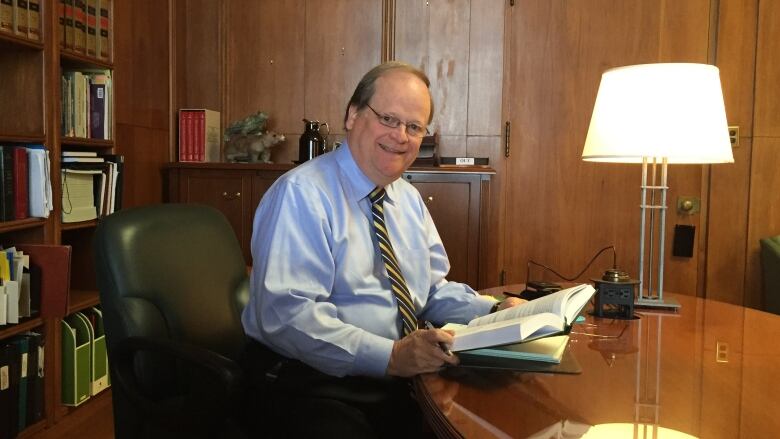Retiring Supreme Court Justice Thomas Cromwell turns focus to legal access
After 8 years, top judge reflects on his biggest cases, bilingualism and regrets over Marc Nadon

The picture hooks on the walls of Justice Thomas Cromwell's office at the Supreme Court are empty now and a few boxes are piled in one corner.
The only personal mementoesstillon display include a large pensive-looking ceramic frog.His official retirement took effect Sept. 1, but Cromwell still has a few judgments to finish off.
"It takes me about 80 hours a week to do this job, but the responsibility of it is also very onerous. The cases are hard, they have broad public implications, sometimes even implications for the structure of our federation," he said in an interview with CBC News.
Cromwell said he always intended to retire around the age of 65, and at 64, the onerous nature of the work helped him decide to give his notice in the spring.
- Justice Cromwell announces retirement from Supreme Court of Canada
- Trudeau outlines selection process for new Supreme Court justices
Cromwell's retirement also gave notice to the federal government to speed up planned reforms to the nomination ofSupreme Court justices. His replacement will be selected through a new process that includes a new independent advisory board chaired by former prime minister Kim Campbell.
Among the more controversial aspects of the process, candidates must be functionally bilingual and the board doesn't necessarily have to honour the historic regional composition of the court.
Cromwell refused to comment on whether the top court needs regional representation, but he did say he sees both sides of the bilingualism debate. "Personally I'm glad I have that capacity, but many people have served well without it."
Feels the weight of office
After eight years on the court, Cromwell estimates he's authored roughly 100 judgments and participated in many more. Among those he's most proud of include references on the Senate and a national securities regulator, as well asthe country'sruling on assisted human reproduction.
"Those things really go to the structure of our constitution and you really feel, I think everyone does, really feel the weight of your office in those cases," he said.

The 2010 ruling on assisted reproduction set out how different levels of governmentregulate fertility clinics. The 2011 reference on a national securities regulator killed the previousgovernment's plan to create a single body to oversee investments such as stocks, bonds and derivatives.
And in 2014, the top court thwarted government plans to legislate changes to the Senate by concluding that implementing fixed terms for senators or provincial elections for the red chamber would require the consent of seven provinces representing half the population.
Cromwell said he also really enjoyed working on the 2012 case where a non-profit group that represents women in the sex trade in downtown Vancouver won the right to challenge the country's anti-prostitution laws on constitutional grounds. The decision had broad implications, as it allows people or groups not directly related to a specific case to challenge Canada's laws.
"I, as an academic in the '80s, had written a book about [legal] standing, so it was quite exciting for me to be able to look at the law from the perspective of the judge and perhaps make it a little more flexible. But I think it was a logical evolution of our jurisprudence that was a very satisfying case to work on," Cromwell said.
We need to have more focus on the needs of the people- Justice Thomas Cromwell
If one case still causes him some discomfort, it is that of Marc Nadon. The Supreme Court was asked to rule on Nadon's eligibility for appointmentto the top courtandif Parliament could unilaterally change the Supreme Court Act to make Nadon eligible. It answered "no" to both questions, which voided Nadon'sappointment.
"Justice Nadon was a very experienced, highly respected judge and I'm sure would make an excellent colleague. The case had absolutely nothing to do with his personal qualification and one of my great regrets about the whole thing is that that message seemed to be lost in a lot of the public discussion," he said.
"I think both the majority and the dissenting judges demonstrated that the court was independent and impartial and would do its best even under quite awkward circumstances."
Confidence in justice system
CBC News also asked Cromwell what could be done to rebuild public confidence in the justice system after questionable conduct by judges in sex assault cases has come to light.In two Alberta cases, appeal courts ruled the judges didn't seem to understandthe law governing sexual assault.
In addition to ongoing education already offered to judges, Cromwell said the judiciary could also delve deeper into a judge's mindset at the outset.
- Supreme Court sets new deadlines for completing trials
- Trudeau won't commit to a Supreme Court judge from Atlantic Canada
"Even look at the appointment process in some respects to ensure that the people who are coming to the courts have the requisite sensitivity, and if they don't, that we are able to put training in place at a very early point in their career," Cromwell said.
Going forward, Cromwell said he looks forward to devoting more time to making the justice system more financially and procedurally accessible to regular people. Supreme Court Chief Justice Beverley McLachlin has asked Cromwell to continue chairing the Canadian Forum on Civil Justice's action committee on access to justice on civil and family matters.
"I think our processes tend to be too complicated, legal services are not available to some of the people who need them because they fall in the cracks between legal aid and being able to fund lawyers....
"We need to have more focus on the needs of the people."












_(720p).jpg)


 OFFICIAL HD MUSIC VIDEO.jpg)
.jpg)



























































































